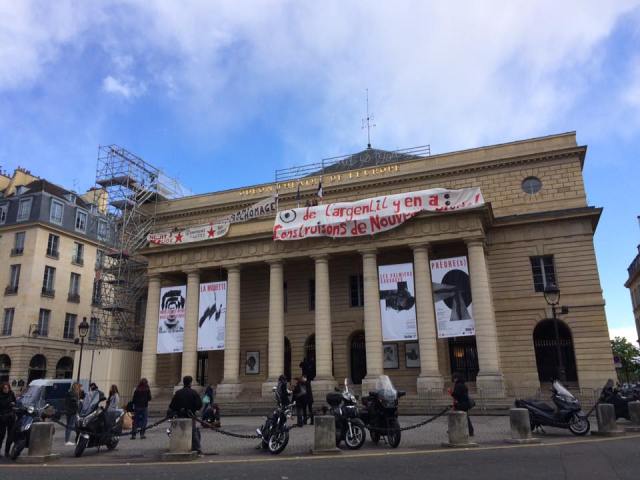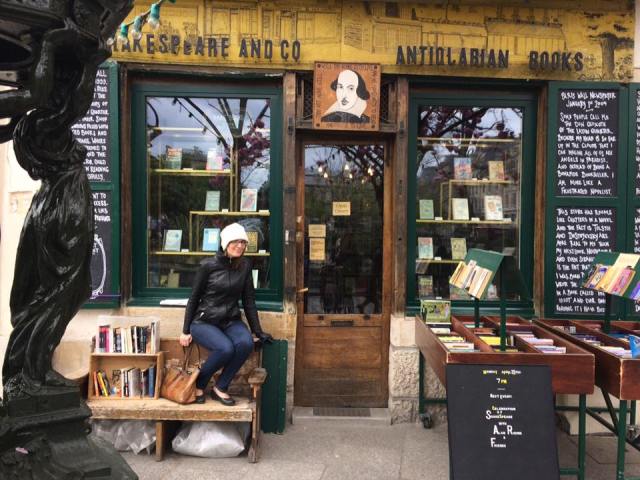Marissa Skudlarek is tramping around Oxford, sending us missives of wisdom.
I embark on my longest vacation in several years, two full weeks, three wonderful cities: New York and then Paris and then Oxford. I pack light, but I do bring my laptop; despite my best efforts, there are some writing projects I need to finish, some tasks I must carry with me across the ocean.
My New York theater critic friend tells me that for a writer, there is no such thing as a non-working vacation.
Around eleven at night, my fourth day in Paris, I burst into tears due to guilt at time slipping away without me working on my writing, then dry my eyes and go to “Paris’s #1 Philosophical-Café” to sip linden-blossom tea and write for an hour before they close.
I do get some writing done when I’m in New York. I take my laptop to Shakespeare and Company on the Upper East Side (not to be confused with the more famous Parisian bookstore of the same name) and drink an iced tea and immerse myself in my work for two hours. “You’ve been here a long time! Writing the Great American Novel?” a man asks as I get up to leave. “The Great American Play, actually,” I say. He introduces himself as the theater editor of the Brooklyn Daily Eagle: “the oldest newspaper in New York. Walt Whitman was our first editor!”
I give the man my card and think about how none of that encounter would ever have happened in San Francisco.
Before I leave for vacation, my friends at PianoFight make a video taking The Bold Italic to task for proclaiming that there are no artists left in San Francisco. I laugh, I love it, I post it on social media. I am deeply invested in the idea that there is wonderful art being made in San Francisco and that this can continue. But sometimes I wonder if I am fooling myself, being blindly optimistic instead of realistic.
I see a beautiful production of La ménagerie de verre, that is, The Glass Menagerie, for fifteen euros. When it’s over, we applaud so much our arms and hands ache; we make the actors take five curtain calls. This is par for the course at French theater productions. The profession of the actor is noble in any society, but it seems so much nobler, so much more respected, in France.
I follow Rue Racine to the Place de l’Odéon, location of one of Paris’s oldest theaters, noting that there are an awful lot of gendarmes in the vicinity, only to discover that the Odéon has been occupied by theater artists and stagehands who are protesting cuts to their unemployment insurance.
Sara Judge, Empress of On the Spot, comments that we ought to do the same thing in this country. I say “First we would actually need job security in order to protest when they try to remove it.” Touché, says Sara.
I overhear a Quebecois theater director, looking very much the Europhile artist in stylish scarf and overcoat, talking about his career while I have lunch at a French café.
I overhear some French youths loudly discussing art and sex over beers, as French youths, or really all youths, are wont to do. “I’m getting busy with Amandine,” says one. “No, you’re getting busy with your ass!” says the other. My back to them, I listen, I take notes, I swell with delight at understanding their slangy French gossip.
Over Shake Shack burgers in Madison Square Park, an Irish fantasy novelist tells me that in Ireland, writers and artists and musicians don’t have to pay tax on the money they earn from their artistic endeavors unless it’s over 50,000 euros a year.
Outside Shakespeare and Company on the banks of the Seine, I meet another Irishwoman, a screenwriter, whose government has awarded her a fellowship to study and research for three weeks in Paris.
I meet a bearded Englishman about my own age who’s been happily living the expat life in Paris for the last seven years, writing and editing and running a theater festival.
I mentally review my own family tree and what I know about the immigration laws of various countries. Could I get European citizenship through a distant ancestor?
I think about how it seems like everyone I know in San Francisco has a well-defined escape plan in their back pocket for when they inevitably get evicted by a greedy landlord, and how over the last year or so, I’ve started to feel like an anomaly because I lack such a plan.
I wonder if those vague daydreams of getting European citizenship are actually the beginnings of my own back-pocket escape plan.
I see how many translated books are displayed for sale in the Paris bookshops, and think with envy of all the French people who can thereby earn a living as literary translators.
I stroll up and down the streets of Paris, the wide avenues lined with Haussmann limestone buildings six or seven stories tall, and think about how everyone always freaks out about building taller buildings in San Francisco (“Don’t turn it into Manhattan!”). But what if we could turn it into, not Manhattan, but Paris?
I think about how when I return to San Francisco, I’ll return to my nasty, petty habit of mentally demolishing any one-story building I see and imagining a five-story housing complex built in its place.
I stop and look at listings in the windows of real estate agents. Despite the dollar-to-euro or dollar-to-pounds exchange rate, the prices seem amazingly reasonable – or have I merely been living in the San Francisco real estate bubble for too long? A room in a shared flat for $750 a month. A three-bedroom Oxford house for $2000 a month. A small Paris one-bedroom, yours outright for $325,000.
The brick houses of Oxford are smaller and narrower and cozier than the painted ladies of San Francisco, but most of them have bay windows, too.
Paris Métro trains come, on average, every five minutes, and I nearly always get a seat, even when I take the busiest segment of the busiest line at rush hour.
San Francisco friends message me to say that a horrible breakdown on the N Judah ruined everyone’s commute. They invite me to feel schadenfreude, and I do, but I also start dreading, truly dreading, going back to BART and MUNI.
My friend Sunil Patel, a Twitter demi-celebrity with friends in every corner of the world (it’s because of him that I had that burger with that Irish novelist), “has a nice moment” with Lin-Manuel Miranda at a book signing. I giggle to myself on a late-night, near-empty Métro train when I see Sunil’s and LMM’s tweets about this momentous encounter. I remember that good things happen and people are doing good work in the USA as well.
My friend Lily Janiak is announced as the new lead theater critic for the San Francisco Chronicle, and again, I remember that despite the many difficulties facing the theater business and the journalism business, sometimes we do get nice things.
In a hipster café on the Cowley Road in East Oxford, a young man tells a friend that his band has been invited to play at a BBC Introducing gig.
In an Italian restaurant on the Upper East Side, another young man tells some friends about his attempts to make it as an indie rock artist and to recruit a sought-after young drummer for his band.
I try to remember when’s the last time I overheard such a conversation in San Francisco at a venue that wasn’t PianoFight.
A San Francisco friend messages me to say that she overheard two cute French people talking in a Hayes Valley café, but they were discussing how to get venture capital funding for a startup.
Marissa Skudlarek is a San Francisco-based playwright and arts writer. For more: marissabidilla.blogspot.com or on Twitter @MarissaSkud.

